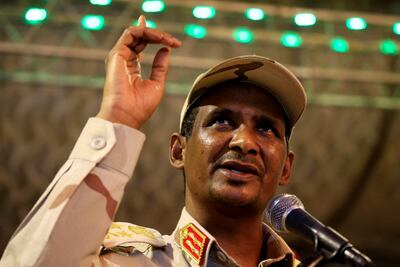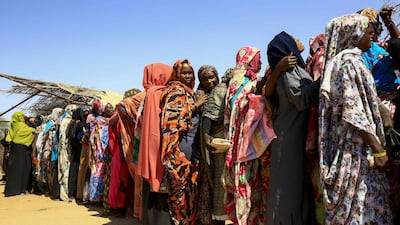The UN says it is “deeply concerned” about a surge in violence in Sudan's western Darfur region and is calling on authorities to restore stability.
Volker Perthes, the UN’s special representative in Sudan, urged “all parties to act with restraint in order to prevent further violence.”
The envoy's call came a day after reports that at least 19 people were killed during clashes in Darfur on Thursday, when armed groups battled in Jebel Moon, close to the border with Chad.
It was the latest in a series of outbreaks of violence between Darfur’s rival groups.
Adam Regal, a spokesman for the General Co-ordination for Refugees and Displaced in Darfur — an independent aid organisation — said Janjaweed militiamen took part in the latest violence.
Many of those militiamen have joined the paramilitary Rapid Support Forces, led by Gen Mohamed Hamdan Dagalo, Sudan’s de facto deputy leader.
“Militias have been attacking the villages of Jebel Moon, setting fire to houses and using automatic rifle fire since Sunday,” said a tribal leader who requested anonymity.
“No government forces have arrived since the attacks on Thursday, and we are terrified of an attack at any time,” he said.

Between last Saturday and Monday, clashes in Darfur left another 16 dead in the same region, said an independent union of medics.
“These events in Darfur are taking place while violence in Khartoum continues,” said the UN, alluding to the continuing deadly clampdown by Sudan’s military rulers against protesters demanding that civilian rule is restored.
A military coup four months ago has sparked a wave of mass street protests in Khartoum and elsewhere in Sudan.
About 90 people have been killed in the protests, most shot by live rounds, while thousands have been injured.
Many people have been killed and hundreds of houses torched in bouts of violence in Jebel Moon as well as elsewhere in Darfur in recent months, the UN and medics say.
Darfur was ravaged by a civil war that erupted in 2003, pitting ethnic minority rebels who complained of discrimination by the Arab-dominated government of then-president Omar Al Bashir.
Khartoum responded by unleashing the Janjaweed militias. They were later blamed for atrocities in Darfur, including murder, rape, looting and burning villages.
The scorched-earth campaign left 300,000 people dead and displaced 2.5 million, the UN has said.
Al Bashir is wanted by the International Criminal Court on charges of genocide and crimes against humanity in Darfur. He was ousted and detained in April 2019 following months of street protests against his 29-year rule.
The latest clashes in Darfur reflect a broader security breakdown in the vast region following the October 25 coup led by army chief Gen Abdel Fattah Al Burhan.
The coup derailed Sudan’s democratic transition and deepened the country’s economic woes, with growing shortages of basic items and a decline in the value of the local currency against the US dollar.
The coup was strongly condemned by Sudan’s western backers, with the US being the most outspoken critic. Washington and the World Bank have suspended aid worth hundreds of millions of dollars.


